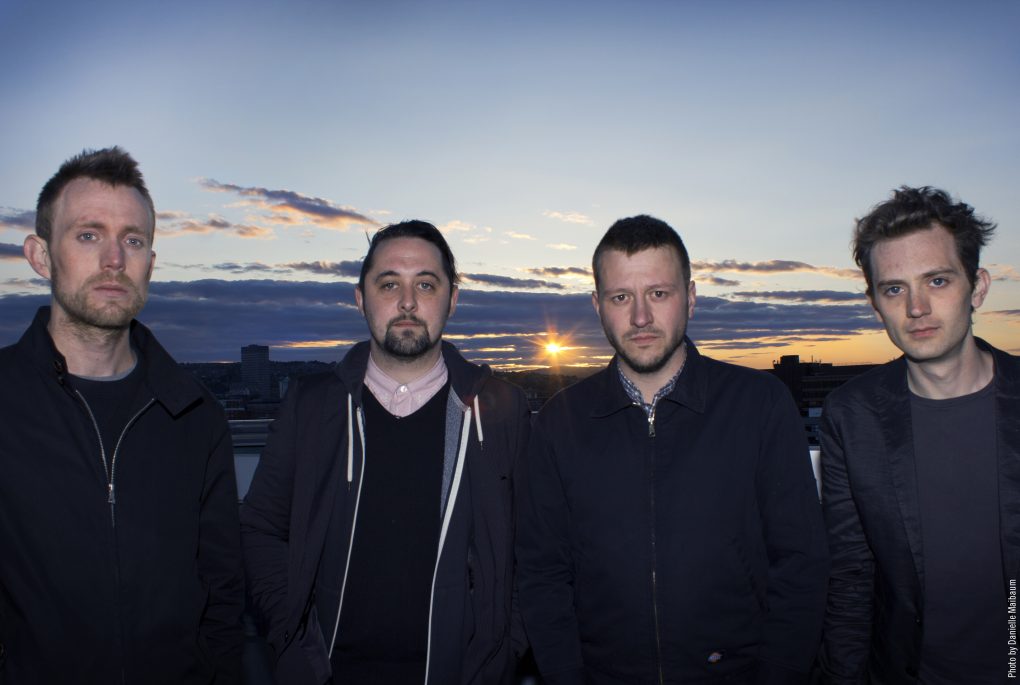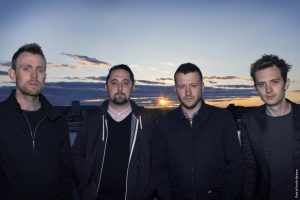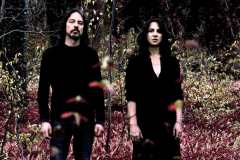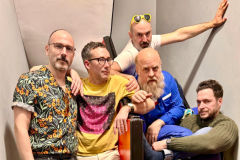Sounds For Humanity; An interview with Paul Wolinski of 65daysofstatic

by Andrew Lampela
As a fan of instrumental rock/metal, I’ll be the first to admit it’s a rather niche genre for a reason. For every Russian Circles or Pelican or Caspian, bands pushing the boundaries of instrumental music into new, richer, more cinematic realms, there are a million bands that crush the soul with the bland post-rock soft-then-loud-then-soft-again-then-really-loud template without ever expressing one iota of originality. It’s almost enough to make me give up the search for anything new in the genre. If I were to do that, however, I’d miss out on discovering bands like England’s 65daysofstatic, which would be a bummer.
Stumbling across the band’s latest, Wild Light, was definitely a fantastic surprise. Wild Light covers quite a bit of ground, from drone to rock to almost dancey bits, infusing the traditional bass-guitar-drums with electronic elements very organically.
Ghettoblaster recently got to chat with Paul Wolinski and here’s what he had to say.
You use both programmed drums and live drums, not to mention what sounds like quite a few samples. What was the impetus for including both? Has that ever gone horribly wrong live? I run quite a few loops when I play live (albeit way more loosely), and I’ve had epic meltdowns. I can’t imagine the precision needed to pull that off.
It seems that the way we evolved as a band is relatively uncommon. From the very beginning, the heavy programming and live band element were completely integrated. We didn’t see ourselves either as a guitar band with added samples or an electronica act with live guitars. It was all thrown together right at the start. Rob joined on drums early on, before our first album proper, but by that time we had started playing shows with big electronic beats, and so click tracks were always involved. Rob’s a great drummer, so it’s always tight, but honestly, ‘tightness’ isn’t something we aim for – with so many electronics going on we’re usually coming at it from the other direction, aiming to inject a bit of humanity back into the sound.
As for problems on stage, we’ve had more than I can bring myself to remember, but none specific to having both electronic and live beats, I don’t think. If Rob’s click drops out he can usually keep time. More likely if anything goes wrong it’s the computers crashing completely.
Wild Light covers quite a bit of ground stylistically, from the dancy-er moments to the dronier moments. What are some of your influences? What does the writing process involve? Do you generally go for a predetermined feel, or is it more spontaneous?
As for influences – the world these days, man. It’s crazy. Can you feel it? We felt it in America last month, that’s for sure. Everything feels like it’s edging inexorably toward the brink of something terrible. The revelations brought about by Edward Snowden and Glenn Greenwald this year happened after we’d finished the record, but the previous two years, reading around the kind of climate that led to that; the Wikileaks-published cables, the Arab Spring… We’re living through some years of Big History, I think. 65 are not particularly good at speaking articulately about any of that, but I have no doubt that it was a major influence on the tone of Wild Light, certainly more so than any music we were listening to.
The writing process for 65 is kind of masochistic, I think. We don’t let ourselves off easily. We know how lucky we are to be doing this for a living, and so we treat it like a proper day job. Long days of the four of us stubbornly sitting in a room with a lot of semi-working musical equipment, drinking lots of coffee, mostly getting nowhere. Good Picasso quote though: “Inspiration exists, but it has to find you working”. That’s what we count on, mostly.
Listening to the album, you strike me as a group of gear heads (which I applaud). Are you as gear laden as I think you are? I have a massive thing for guitar pedals, and always like to ask what favorites bands have. Is it difficult touring with specific gear needs? With a reliance on loops and samples, I’d imagine you tour with specific things, what happens when something breaks? I’m curious due to my own reliance on a busted-the-hell-up Akai Headrush that occasionally decides to ruin my night.
I have a busted up Headrush that occasionally decides to ruin my night too! Probably had it for about six years at this point. I have literally no sentimentality towards it though and I think that’s quite a healthy approach, these days.
It’s funny, I guess we are gear heads in the sense that Si (bass) and I are really geeky about synths and samplers and so on, and Joe and Rob are into their guitars, pedals and drums, but 65 is in this strange limbo where we are fortunate enough to be releasing records and touring the world, but nowhere near successful enough to actually buy any of the equipment we lust after. Hiring vans and fixing our current, broken gear is usually where that money goes.
Touring logistics is another constraint. This is a lesson we’ve learnt with Joe’s guitar pedals. When we fly, we have to fly all of them because the sounds he creates are so unique. But that’s a lot of weight, and it’s a lot of stuff that might break in transit. Therefore, with the electronic side of things, the live shows are now run off two laptops and lots of midi controllers. In past incarnations of the live show that’s been a lot more hardware- based, but it’s just too unwieldy to tour with. I suspect going forward, 65 are going to be heading deep into analogue synth territory, but it wouldn’t surprise me in the slightest if once we’ve written things, we end up transposing most of that to laptop-based samplers. We’re definitely not purists in that sense, and actually, I think with the power of software like Ableton Live and Maschine these days, software enables us to do a lot more ‘properly- live’ electronics than sticking to hardware would. Not as romantic, maybe, but it works for us.
You just finished a co-headlining tour with the always excellent Caspian. How did that go? Is it difficult touring with another instrumental band? I personally would enjoy it, but was it a tough sell at all? You covered a massive area in less than a month, how did that treat you? Did you get to do anything fun (besides the shows, of course)?
Caspian were great guys. There was a really funny conversation toward the end of the tour where it emerged that both us and them had been really wary of the tour. We’re both two bands desperate to escape the ‘post rock’ tag we so often get labeled with, and when we tour we normally try and tour with bands who sound nothing like us. It feels so much more exciting that way. So we got packaged together in the name of efficiency and confusing things about ‘A markets’ and ‘B markets’ in America – a lot of music industry nonsense talk that we don’t really want to understand, but it turned out that despite that we all got on really well and quickly realized that although we both happen to be instrumental bands, we’re on different paths, focusing on different things, and so complimented each other really nicely.
As for fun – there was literally nothing but truck stops and asphalt between the shows. Like you say – we covered a massive area in three and a half weeks. If we weren’t onstage, we were on the road. It was pretty intense, but I’m glad we did it. And, you know, even on the most luxurious tour you could imagine, the shows are still the best part of the day.
Any plans going in to the new year that I can help you share?
We’re juggling continuing-to-tour the new record, Wild Light, with the tenth anniversary of our first album, The Fall of Math. We’re doing some shows in Europe in the spring where we’ll play two sets, the first being The Fall of Math in its entirety. It’s something a bit different for us, because we’re not big fans of nostalgia and as a band have been stubbornly looking at nowhere but the horizon for a decade now. But it’s shaping up to be an exciting project.









Social Media